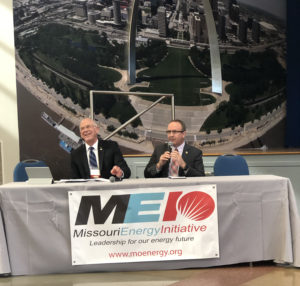This story is included in a multi-part series
ST. LOUIS, Mo. – Senator Ed Emery and Representative Rocky Miller attended the Missouri Energy Initiative Midwest Policy Series Energy Economic Development on Wednesday to provide attendees with an outlook on what could be expected during the upcoming legislative session.
“We had a really good year when it comes to energy environment and things along that way. Mostly due to the work quite honestly with Senator Emery,” Miller said. “He sent me over a great piece of legislation that we were very happy to work with.”
Emery agreed with Miller, it was a good year to get the bill passed. He said it had been a long time coming to modernize the state’s infrastructure.
“We tried a number of different approaches,” Emery said. “And we were finally able to break it down to a very simplified approach and we were able to make it work.”
Coming into the 2019 legislative session, Emery said there are still some “leftovers” from 2018. He said the State Energy Plan is one and he thinks this will be a good year to get it passed. There are also items of regulating natural gas and the rates that are applied, water utilities looking at statewide interests and electric vehicle charging stations.
Emery also noted that he has seen a lot of activity in terms of refiling on tort, education and criminal justice reforms.
“We’re already having trouble funding our infrastructure, our roads, in the state of Missouri. If we add the fact that we’re going to take 10 percent of those out of the mix paying fuel tax, what are we going to do?” Miller said. “So getting into what we’re going to do next year, I think it’s really important that we watch that and make sure we look at our future and have things in place to take care of it.”
New methods, new technologies and what regulations are needed, are items that Miller believes will be a focus in the new year. He said the reason for that is because the “scariest” thing out there is the initiative petition and it is easy to change the Missouri State Constitution. Miller also wants the legislation to “get a handle on” IP.
“I think we need to get a handle on what we’re doing,” Miller said. “Energy legislation is not that sexy, you don’t see a lot of news on it…but it’s coming. That’s where we are and that’s my thoughts going into the future.”
Emery said he would be surprised if there are no previous questions in motion. He said that there are a lot of hard, controversial issues for this year’s session that will need room for concerns to be addressed.

Miller said that there will definitely be serious questions in the House, but that it can never be known what surprises will happen. He said that there will be personal freedom issues and tort reform coming through.
“Economic development is a big part of what we’ve been told to do,” Miller said. “Our governor has said that economic development is job one for us. So, where are we going with that? Energy is a huge part of our economy, we have to make sure that we make it easier to grow the economy in Missouri.”
The conversation about the future plans for economic development in the Show-Me State took a turn to focus on climate change per the questions from attendees Washington University Professor Bert Gustafson and energy consultant Kimberly Wallis.
“With all this talk about energy, we know that climate change is happening. It produces effects like hurricanes which make us vote economic resources to fixing those messes rather than putting it into our communities and building our communities,” Wallis said. “Within Missouri, within the energy sector, if you could snap your fingers to do one thing to combat climate change what would it be?”
Miller said that to combat climate change in Missouri, it is “egotistical of the human race” to think there is much of an input from the human body. He said he thinks that the human race is responsible for some climate change, but not at a large extent.
Emery took note of the scientific consensus, mentioning that he has a “fundamental problem” as a scientist to believe in the sciences as a consensus.
“But, if you look at the consensus it isn’t about the human element of climate change,” Emery said. “It’s about that they believe there has been some climate change.”
Emery also said that an issue that should be readdressed is the opinion of the courts that designated carbon dioxide as a contaminant.
“There is no scientific evidence that confirms that,” Emery said. “There is a significant amount of experimental evidence that says increased concentrations of Co2 aren’t very good for the human race. There are two things that all of us are mindful of: feeding the world and understanding how precious water is. Two measurable impacts of increased levels of Co2 are that they make plants grow faster and those plants use less water when Co2 concentrations are higher. We know that we have experimentation that proves that. If you go online you can find all of that.”
Emery said climate change results in many open-ended arguments and allows room for differences of opinion.
“I find it a little bit scary to hear your comments, Senator, questioning scientific consensus,” Gustafson said. “But, as I tell my students, sometimes people are operating on different planes of rationality and it’s very difficult to argue with someone who is not on the same plane of rationality.”
Gustafson mentioned the economic growth and job growth in new technologies discussed at the series on Wednesday. He said that he heard “resistance” in the legislators’ comments in supporting the expansion of renewable energy at the legislative level.
“I find that very curious given the fact that renewable energy is the prompt here of economic growth and job development nationally and around the world,” Gustafson said. “So are you or are you not supporting job growth and economic development by supporting this expansion of global energy?
“I don’t believe the government creates jobs,” Emery said. “I believe the private sector creates jobs. And I am also very resistant to government mandates with the justification that they’ll create jobs.”
Wallis addressed the room of attendees and speakers and said it is important for any topic that involves energy to also include the topic of climate change.
“I urge you to be thinking about that broader topic and to ask questions that are relevant to our community,” Wallis said.

